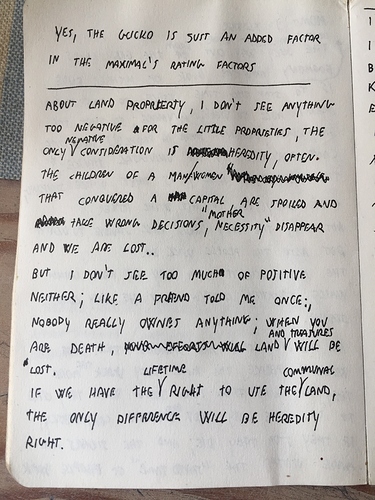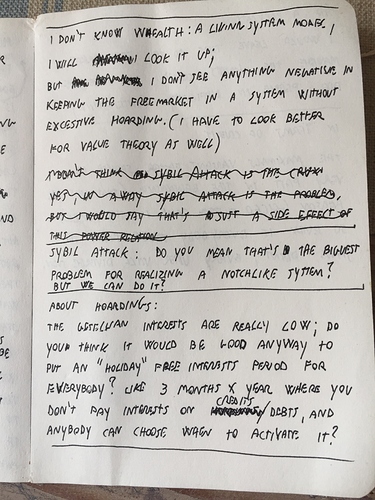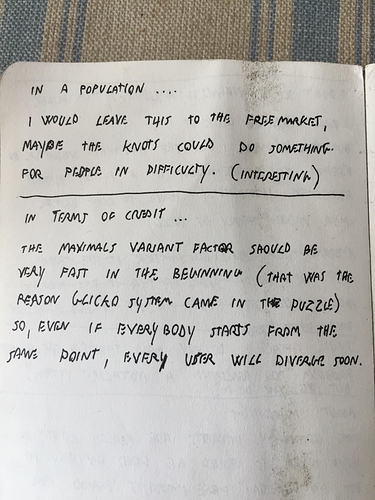@guillemcordoba where could I read more about your thoughts on demurrage? Is it an attempt to disincentivize hoarding? I’m very interested in these concepts, and would definitely like to build libraries. Mainly I just need to know what would be helpful / what we want to see, and then some technical Q’s on network specs.
@CapitanSgrakkio As a Magic The Gathering player, I can advocate for the Glicko system, You mention chess also, which is ELO from my understanding, so are you talking about incorporating elements of both? Maybe I’m just wrong about the methods these games use haha. They are pretty good algo’s imo but of course there is always opportunity for improvement, as with anything. I understand the desire to eliminate sample size bias, like these methods try to do, but in my opinion economic and ‘game’ theory are much more intricate.
Points of contention with Silvio Gesell:
Land ownership is not inherently a bad thing. While I do understand where he’s coming from, I think its important to address how we define ‘private property’ in relation to these principles. Is it possible that the entities in charge of ownership are the problem, instead of the idea of private ownership in general? Perhaps we can develop systems to better govern ownership and legal identities, as well as regulation of productive output. This idea extends to government as well. For example, I would happily give the power of decision over land and governance to spiritual or other moral leaders whom I trust and believe will attempt to provide maximum benefit for all. So it looks like the Terre-de-Liens project you referenced attempts to address this concept for land use, which seems great to me! 
Furthermore on Gesell, I disagree with his stance against ‘value theory’. I would argue that value is fundamentally important, but the reason he correctly opposes value metrics in the current system is because their dynamics are massively incomplete. This is why I look to Wealth: A Living Systems Model in terms of elaborating our schemes for defining and measuring value. We have the technology to operate in a comprehensively detailed and always evolving model – we’re just not doing it right now.
As regards to your paper, I will point out the following:
Sybil Attack is the crux of what we’re facing, right? So I think biometrics are clearly going to be the game-changer. I see Holo as a necessary stepping stone between our current centralization to first limited sovereignty and then all the way to decentralization.
“As in the natural world it isn’t possible to store material goods indefinitely, the society/economy must to mirror the value and properties of the material goods exchanged, that are subjected to entropy and are useless when they are excessive.”
This is true for most goods, but what about services? I do strongly agree that excessive hoarding is severely detrimental. However, in terms of ‘store of value’ this is not necessarily true. Something can be used to measure value and not be subject to entropy. How do we deal with temporary hoarding? Are there not appropriate times to conserve resources? Are there appropriate times to hoard currency or assets? If I provide tremendous service for a few years that has lasting impact, is it not fair to allow me to take a break and disburse my “reward” over a period of time (ie retirement, vacation, etc)?
Perhaps the analogy of energy potential is more appropriate. Momentum is relevant in physics and I think also in economy because value can sometimes be described in terms of momentum. I do not believe that velocity should be so greatly emphasized. It’s definitely important to measure and obviously consumerism is valuable, however, I believe that it’s the allocation, effectiveness, and balance of resources that lead to harmonious equilibrium, as well as ‘potential/momentum’ for the future.
In a population of 100, if it is measured that 75 do not contribute a productive capacity above their consumption, but all 100 have sufficient allocation of resources, (assuming the 25 are happy/healthy) then the model can be deemed appropriate in terms of equilibrium. On the contrary, if 75 contribute above their means of need and 25 do not, but only 50 receive sufficient inventory due to mis-allocation of ‘value’ then well it seems apparent that model 1 is more ideal than model 2.
Is it possible that people would prefer 10 go hungry if the system rewarded productive output proportionally where the 90 receive above the minimum as necessary for survival?
Sure, and really this boils down to a moral issue, not an economic one.
Interestingly enough, regardless of morality, if the 10 disrupt the flow of the system in attempt to gain their necessary resources, then it can be unanimously agreed on a collective level that this model is unsustainable to group survival.
In my opinion, the net Expected Value (EV) is more important than the direction and velocity. Sometimes value (potential) does in fact need to be saved for later… think about a capacitor holding a charge.
p = mv and EV = (probability x all gains) - (probability x all losses)
perhaps even better is EV = [(% x gain) + (% x future gain)] - [(% x loss) + (% x future loss)]
pretty sure we can all agree that if the future loss is something like species extinction then the overall equation sucks lol
Your idea of maximals is very good. It makes alot of sense to cap things (nature does it automatically through cycles – as soon as a threshold is met, then it swings back toward the other direction. Energy is always conserved and therefore entropy only applies to a closed system, but keep in mind the universe is quite open, and thus it is only the scale at which we observe that is subject to range limits.)
In terms of credit, I leave you this idea: not all credit is created equal.
We tend to focus alot on the ability to repay credit, but game theory has taught me such that in certain cases, a 10% chance of 100,000 is greater than 90% chance of 1,000.
In other circumstances, failure could mean 0, in which case the higher probability results in the highest EV. Understanding which algo to apply and when, matters alot.
One other point I think is interesting to talk about is that there is a huge disconnect between need and production. Think about all the produce that goes bad in the grocery, or fast food that gets thrown out at the end of the night.
We can all agree that effective utilization and appropriate distribution of resources needs to be incorporated into any model.
I guess, small scale production would be much more effective in this. When everybody in the production “machine” has responsibility and you can’t afford a big failure…
sorry man but going to need a typed version to be helpful. DM me if u want
Sure, sorry. Dm? direct message?



